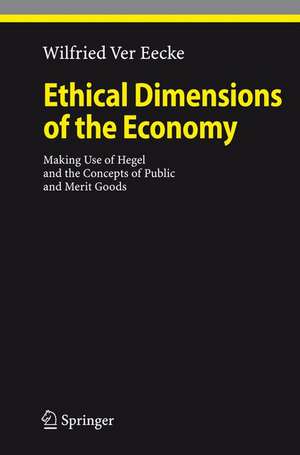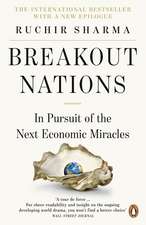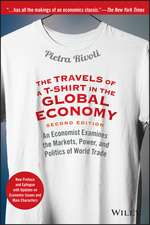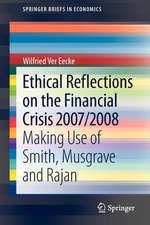Ethical Dimensions of the Economy: Making Use of Hegel and the Concepts of Public and Merit Goods: Ethical Economy
Autor Wilfried Ver Eeckeen Limba Engleză Hardback – 11 mar 2008
Toate formatele și edițiile
| Toate formatele și edițiile | Preț | Express |
|---|---|---|
| Paperback (1) | 641.53 lei 6-8 săpt. | |
| Springer Berlin, Heidelberg – 30 noi 2010 | 641.53 lei 6-8 săpt. | |
| Hardback (1) | 647.92 lei 6-8 săpt. | |
| Springer Berlin, Heidelberg – 11 mar 2008 | 647.92 lei 6-8 săpt. |
Din seria Ethical Economy
- 18%
 Preț: 788.72 lei
Preț: 788.72 lei -
 Preț: 280.54 lei
Preț: 280.54 lei - 18%
 Preț: 1007.35 lei
Preț: 1007.35 lei - 18%
 Preț: 892.90 lei
Preț: 892.90 lei - 18%
 Preț: 782.42 lei
Preț: 782.42 lei -
 Preț: 497.00 lei
Preț: 497.00 lei - 15%
 Preț: 644.95 lei
Preț: 644.95 lei -
 Preț: 387.38 lei
Preț: 387.38 lei -
 Preț: 486.42 lei
Preț: 486.42 lei - 18%
 Preț: 948.79 lei
Preț: 948.79 lei - 18%
 Preț: 958.38 lei
Preț: 958.38 lei - 15%
 Preț: 634.18 lei
Preț: 634.18 lei - 15%
 Preț: 639.59 lei
Preț: 639.59 lei - 18%
 Preț: 942.94 lei
Preț: 942.94 lei - 15%
 Preț: 635.31 lei
Preț: 635.31 lei - 18%
 Preț: 949.42 lei
Preț: 949.42 lei - 15%
 Preț: 635.15 lei
Preț: 635.15 lei - 15%
 Preț: 635.47 lei
Preț: 635.47 lei - 18%
 Preț: 893.84 lei
Preț: 893.84 lei - 18%
 Preț: 948.92 lei
Preț: 948.92 lei -
 Preț: 391.61 lei
Preț: 391.61 lei - 18%
 Preț: 948.61 lei
Preț: 948.61 lei - 18%
 Preț: 1232.09 lei
Preț: 1232.09 lei - 18%
 Preț: 951.91 lei
Preț: 951.91 lei - 18%
 Preț: 1226.11 lei
Preț: 1226.11 lei - 18%
 Preț: 936.93 lei
Preț: 936.93 lei - 15%
 Preț: 641.53 lei
Preț: 641.53 lei - 18%
 Preț: 953.35 lei
Preț: 953.35 lei - 15%
 Preț: 635.96 lei
Preț: 635.96 lei - 18%
 Preț: 958.38 lei
Preț: 958.38 lei - 15%
 Preț: 632.55 lei
Preț: 632.55 lei - 15%
 Preț: 641.20 lei
Preț: 641.20 lei - 15%
 Preț: 633.53 lei
Preț: 633.53 lei - 15%
 Preț: 646.30 lei
Preț: 646.30 lei - 18%
 Preț: 949.23 lei
Preț: 949.23 lei -
 Preț: 487.57 lei
Preț: 487.57 lei - 15%
 Preț: 639.59 lei
Preț: 639.59 lei - 15%
 Preț: 636.45 lei
Preț: 636.45 lei - 18%
 Preț: 942.01 lei
Preț: 942.01 lei - 18%
 Preț: 964.23 lei
Preț: 964.23 lei - 18%
 Preț: 1221.69 lei
Preț: 1221.69 lei
Preț: 647.92 lei
Preț vechi: 762.26 lei
-15% Nou
Puncte Express: 972
Preț estimativ în valută:
124.02€ • 134.76$ • 104.24£
124.02€ • 134.76$ • 104.24£
Carte tipărită la comandă
Livrare economică 22 aprilie-06 mai
Preluare comenzi: 021 569.72.76
Specificații
ISBN-13: 9783540771104
ISBN-10: 3540771107
Pagini: 320
Ilustrații: XIV, 304 p.
Dimensiuni: 155 x 235 x 22 mm
Greutate: 0.63 kg
Ediția:2008
Editura: Springer Berlin, Heidelberg
Colecția Springer
Seria Ethical Economy
Locul publicării:Berlin, Heidelberg, Germany
ISBN-10: 3540771107
Pagini: 320
Ilustrații: XIV, 304 p.
Dimensiuni: 155 x 235 x 22 mm
Greutate: 0.63 kg
Ediția:2008
Editura: Springer Berlin, Heidelberg
Colecția Springer
Seria Ethical Economy
Locul publicării:Berlin, Heidelberg, Germany
Public țintă
ResearchCuprins
Normative Reflections on the Economy.- The Interconnection of Moral and Economic Theory.- Economics and Politics in the Architectonic of Hegel’s Thought.- The Ethical Function of the Economy.- The Economic Order: A Human, Not a Natural Institution.- The Concept of “Merit Good” and the History of Economic Thought.- Objecting to a Libertarian Attack on Governmental Functions in the Economy: The Concept of “Public Good”.- Applications.- Structural Deficiencies in the American System.- Unjust Redistribution in the American System.- The Role of Religion and Civil Society in a Transformed Command Economy.- Overlapping Ideas: Catholic Social Thought and Recent Nobel Laureates in Economics.- Conclusion.
Recenzii
From the reviews:
"This book draws heavily on Hegel to outline ethical dimensions of the economy. … The book would be most worthwhile for readers who are interested an argument that Hegel’s ideas are consistent with standard public goods theory, and with Musgrave’s concept of merit goods. … the book may be more appealing to philosophers who are interested in building a bridge between economics and philosophy to consider the role of government in the economy." (Randall G. Holcombe, Public Choice, Vol. 138, 2009)
“This book is a philosophical and ethical reflection on economics. … each chapter is preceded by an orienting abstract that points out the major argument that the chapter develops. … an excellent reading for faculty discussion groups bringing together the social sciences and the humanities.” (John Donovan, The Reviews of Metaphysics, Vol. LXIII (2), December, 2009)
"This book draws heavily on Hegel to outline ethical dimensions of the economy. … The book would be most worthwhile for readers who are interested an argument that Hegel’s ideas are consistent with standard public goods theory, and with Musgrave’s concept of merit goods. … the book may be more appealing to philosophers who are interested in building a bridge between economics and philosophy to consider the role of government in the economy." (Randall G. Holcombe, Public Choice, Vol. 138, 2009)
“This book is a philosophical and ethical reflection on economics. … each chapter is preceded by an orienting abstract that points out the major argument that the chapter develops. … an excellent reading for faculty discussion groups bringing together the social sciences and the humanities.” (John Donovan, The Reviews of Metaphysics, Vol. LXIII (2), December, 2009)
Textul de pe ultima copertă
This book reflects philosophically about the socio-political dimension of economics.
Part I provides normative reflections on the economy: Section I reflects on the interconnections between the multiple discourses on the economy, section II presents Hegel's claim that the economic order is an ethical institution and defends his ontological view of the economy against the one of Adam Smith. Section III dialogues with economists about their concepts of public and merit goods. This section defends a Hegelian ontology of the economy through an analysis of technical concepts used by economists.
Part II provides applications derived from the normative analysis: Section I presents the views of authors in different academic disciplines pointing to failures in late capitalism, in particular failures of American capitalism and section II asks the question: " What must one pay attention to in a transition from a command economy to a free market?"
Section III draws attention to an overlap of ideas found in Catholic Social Thought and in the publications of some recent Nobel prize winners in economics (Buchanan, Sen, Stiglitz).
Part I provides normative reflections on the economy: Section I reflects on the interconnections between the multiple discourses on the economy, section II presents Hegel's claim that the economic order is an ethical institution and defends his ontological view of the economy against the one of Adam Smith. Section III dialogues with economists about their concepts of public and merit goods. This section defends a Hegelian ontology of the economy through an analysis of technical concepts used by economists.
Part II provides applications derived from the normative analysis: Section I presents the views of authors in different academic disciplines pointing to failures in late capitalism, in particular failures of American capitalism and section II asks the question: " What must one pay attention to in a transition from a command economy to a free market?"
Section III draws attention to an overlap of ideas found in Catholic Social Thought and in the publications of some recent Nobel prize winners in economics (Buchanan, Sen, Stiglitz).
Caracteristici
Not purely philosophical but enters into a dialogue with economists Interdisciplinary approach Includes supplementary material: sn.pub/extras










